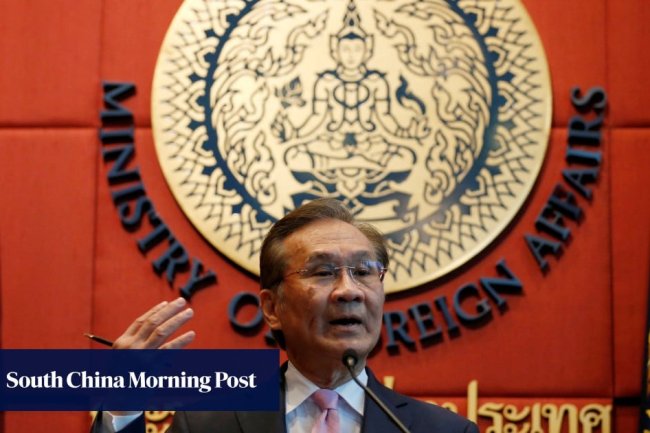China-US relations: Washington unites around mission to prevail over Beijing by boosting defence spending
2023.04.16 23:00As US military chiefs and defence officials sat before Congress appropriations committees to seek funding for the 2024 financial year, one country dominated discussions: China.United States Secretary of the Air Force Frank Kendall raised concerns about China’s expanding nuclear arsenal and Secretary of the Navy Carlos Del Toro spoke of China’s fishing fleets that “prey on countries” weak in protecting their exclusive economic zones.General Mark Milley, chairman of the Joint Chiefs of Staff, said the US must prevail over China in all domains of war to preserve the peace between great powers that has been kept since World War II.Beijing’s rising defence spending and rapid military modernisation – helped by the military-civil fusion strategy that enlists China’s private sector to develop advanced defence technologies – have fomented a strong consensus between the Congressional Republicans and Democrats on China.Such bipartisan accord is a rarity on politically polarised Ca


As US military chiefs and defence officials sat before Congress appropriations committees to seek funding for the 2024 financial year, one country dominated discussions: China.
United States Secretary of the Air Force Frank Kendall raised concerns about China’s expanding nuclear arsenal and Secretary of the Navy Carlos Del Toro spoke of China’s fishing fleets that “prey on countries” weak in protecting their exclusive economic zones.
General Mark Milley, chairman of the Joint Chiefs of Staff, said the US must prevail over China in all domains of war to preserve the peace between great powers that has been kept since World War II.
Beijing’s rising defence spending and rapid military modernisation – helped by the military-civil fusion strategy that enlists China’s private sector to develop advanced defence technologies – have fomented a strong consensus between the Congressional Republicans and Democrats on China.
Such bipartisan accord is a rarity on politically polarised Capitol Hill, making budget requests for military spending easier to justify.
“They’ve had better reception given the bipartisanship because the administration is very focused on China,” said Mark Cancian, an international security programme adviser at the Centre for Strategic and International Studies (CSIS), a Washington-based think tank.
He pointed to US President Joe Biden’s 2019-20 campaign rhetoric which was already underscoring the need to address China’s rise. Once in office, Biden added to the litany of sanctions imposed by his predecessor Donald Trump targeting China’s military-industrial complex.
Pentagon bid to boost funding in Pacific seen as welcome move in region
Cancian said the Pacific Deterrence Initiative – a fund to tackle China in the Indo-Pacific for which US$9.1 billion was earmarked for the 2024 financial year – displayed the greatest bipartisan effort on China. While it was a package of existing spending items, the initiative showed interest and focus on the country.
“China’s military modernisation has continued at a very fast pace,” said Washington-based research associate Aaron Lin, who tracks and forecasts US defence budgeting at Janes, a defence intelligence firm. “It also has made funding a little bit easier to get.”
Biden released a request on March 10 asking Congress to approve a defence budget of US$886 billion – a 3 per cent growth over the previous financial year – of which US$842 billion was set aside for the Pentagon. The defence budget was more than half the entire year’s budget request of US$1.695 trillion.
It was the Pentagon’s “most strategy-driven request” targeted at China, US Defence Secretary Lloyd Austin said in a statement to Congress when the defence budget was released. The department has labelled China “the most consequential strategic competitor” because of its leading role and potential to outpace the US on multiple fronts, including the military.
In the 2022 edition of the official National Defence Strategy, the Biden administration called China a “pacing challenge”. The document is published every four years and outlines the Pentagon’s plans to maintain global security.
Austin said: “This budget seeks to meet this critical challenge today, tomorrow and into the future by providing the resources today to continue to implement our National Defence Strategy and keep our nation safe while delivering a combat-credible joint force that is the most lethal, resilient, agile and responsive in the world.”
China has gained quickly on the US, often by closely studying and adapting American military doctrines, cutting-edge technologies and how the government works with the domestic defence industry. In some areas, such as hypersonic weapons, the US believes China has capabilities on par with itself.
According to Lin, the Pentagon recognised this and programmes addressing a potential contest with China – such as long-range cruise and hypersonic missiles – were better funded than the rest of the budget. Funds were redirected from spending that aimed at counter-insurgency, which the US had focused on in the Middle East for decades.
“Now, you have a US military that realises, ‘oh my gosh, we have not invested in long-range missiles for 20 years and meanwhile, the Chinese, the Russians and the Iranians have been going full steam ahead in this area for the past 20 years. And so we need to kind of catch up’,” he said.
Singapore expects defence spending to increase ‘literally all over the world’
But the bipartisan resolve in the US to tackle the perceived threat from China was offset by the usual opposition to greater government spending in general.
Concerns over inflation from the disruption of global supply chains and sanctions on Russia for its invasion of Ukraine have only made some quarters of Congress more concerned about the largest peacetime budget for the defence department in nominal dollar terms.
“Congress has many voices,” Cancian said. “There are defence hawks, but there are also progressives who are very sceptical about defence spending, and there are deficit hawks who are sceptical about all spending. Every year there’s a negotiation, argument among those voices”
“A lot depends on the general sense of threat and need, and that’s been increasing between Ukraine and China.”
The Pentagon requested more funding for the 2024 financial year to buy long-range cruise missiles: AGM-158B joint air-to-surface stand-off missiles – extended range, known as JASSM-ER, and AGM-158C long-range anti-ship missiles (LRASM). Cancian said the missile procurement was not only a response to the Ukraine invasion but also the war-gaming of a conflict between mainland China and Taiwan, which he and others ran for the CSIS.
The People’s Liberation Army (PLA) held military drills around Taiwan from April 8 to 10 for a second time in eight months to respond to Taiwanese President Tsai Ing-wen, who defied Beijing’s warnings to meet US House Speaker Kevin McCarthy in California. Beijing opposes official ties between Taiwan and the US.
Beijing sees Taiwan as a breakaway province to be united with the mainland, by force if necessary. Most countries, including the US, do not recognise the self-ruled island as an independent state, but Washington opposes any attempt by Beijing to take the island by force. Washington is also required by the US Taiwan Relations Act to arm the island for defence.
What is Discord, the chat app tied to leak of US documents on Ukraine war?
Although speeches and exchanges in Congress appropriations subcommittees on defence might reveal hawkish perspectives towards China, Lin said it was difficult to discern genuine military concerns from hardline rhetoric.
“Military leaders have a very, very clear goal and objective,” he said. “They have to plan for what is the biggest threat that I need to be prepared for, whether or not it is actually going to happen in the next five, 10 years.
“A military’s like an insurance policy. Should it happen, the military needs to plan for the biggest possible threat. PLA planners do the exact same thing.”
What's Your Reaction?













